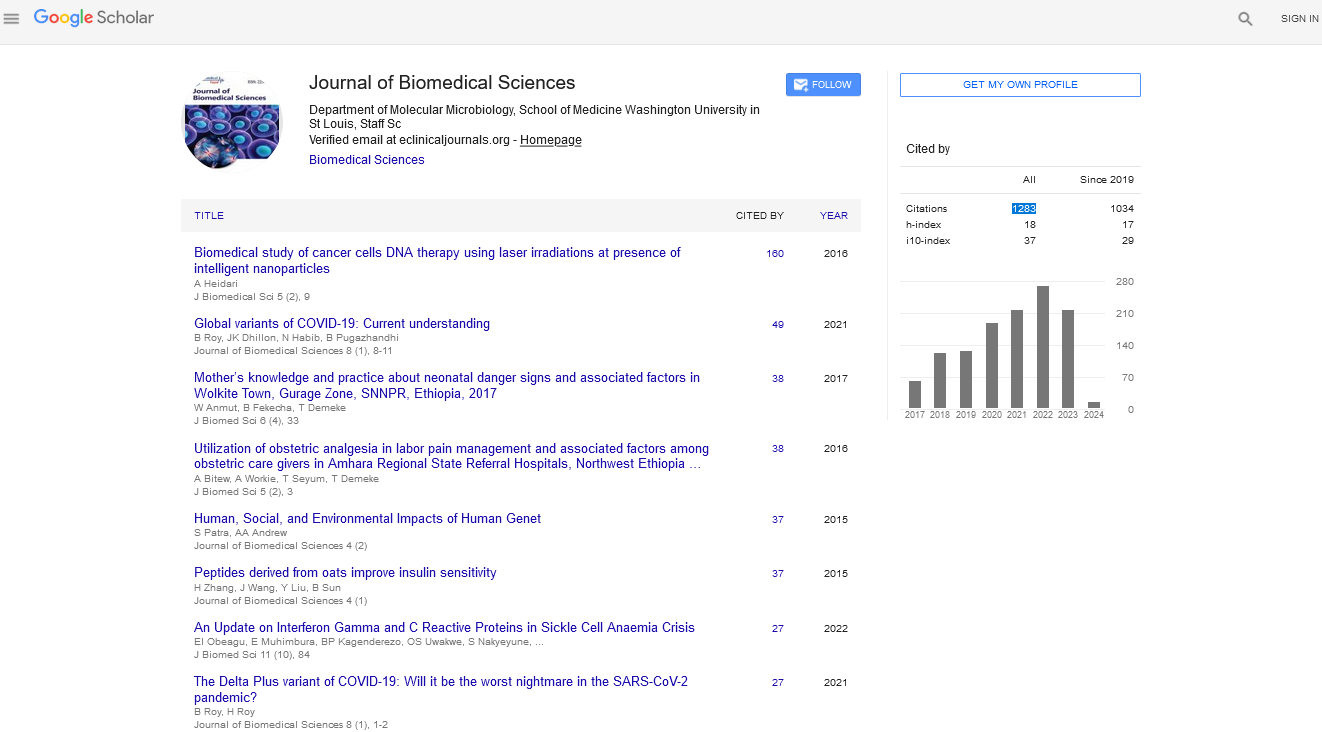Commentary - (2024) Volume 13, Issue 5
Immune System Modulation for Cancer Therapy
Chien-Min Chen*
Department of Biomedical Sciences and Engineering, National Central University, Taoyuan, Taiwan
*Correspondence:
Chien-Min Chen, Department of Biomedical Sciences and Engineering, National Central University, Taoyuan,
Taiwan,
Email:
Received: 17-Sep-2024, Manuscript No. IPJBS-24-15325;
Editor assigned: 20-Sep-2024, Pre QC No. IPJBS-24-15325 (PQ);
Reviewed: 04-Oct-2024, QC No. IPJBS-24-15325;
Revised: 14-Oct-2024, Manuscript No. IPJBS-24-15325 (R);
Published:
21-Oct-2024
Description
Cancer therapy has advanced significantly in recent years,
particularly with the rise of immune-based treatments. Immune
system modulation, also known as immunotherapy, is
transforming cancer care by utilizing the body’s own defenses to
identify, target, and destroy cancer cells. Unlike traditional
therapies, which can damage healthy cells along with cancer
cells, immune-based approaches are designed to specifically
target malignancies, often resulting in fewer side effects. This
article explores the mechanisms, types, applications, and future
potential of immune system modulation in cancer therapy.
Understanding immune system modulation in
cancer
The immune system constantly patrols the body, identifying
and eliminating abnormal cells, including potential cancer cells.
However, cancer cells can evade immune detection through
various mechanisms, such as expressing proteins that suppress
immune responses or creating a microenvironment that hinders
immune activity. Immune system modulation aims to overcome
these evasion tactics, reactivating the immune system to
effectively target and eliminate cancer.
Immune surveillance and evasion: Cancer cells use multiple
strategies to avoid immune detection. They may downregulate
antigen presentation, mask themselves from immune cells, or
even secrete molecules that inhibit immune cell function.
Understanding these mechanisms has led to the development of
therapies that counteract these evasion strategies, allowing the
immune system to recognize and combat cancer cells more
effectively.
Types of immunotherapies in cancer treatment
Several immunotherapeutic strategies are being employed or
investigated for cancer treatment, including immune checkpoint
inhibitors, adoptive cell transfer, cancer vaccines, and cytokine
therapies. Each method works by enhancing the immune
system's capacity to fight cancer, either by boosting immune
activity or by removing inhibitory mechanisms.
Immune checkpoint inhibitors: Checkpoint inhibitors are
drugs that block proteins, such as PD-1, PD-L1, and CTLA-4,
which act as brakes on immune cells. By inhibiting these proteins, checkpoint inhibitors allow T-cells, a type of immune
cell, to attack cancer cells more vigorously. For instance, drugs
like pembrolizumab (Keytruda) and nivolumab (Opdivo) target
PD-1/PD-L1 interactions, reactivating T-cells that were previously
suppressed by cancer cells. Checkpoint inhibitors have shown
success in treating various cancers, including melanoma, lung,
and bladder cancers.
Adoptive Cell Transfer (ACT): ACT involves collecting a
patient’s immune cells, modifying or expanding them in the lab,
and reinfusing them to target cancer. A form of ACT known as
CAR T-cell therapy engineers T-cells to express Chimeric Antigen
Receptors (CARs) that specifically recognize cancer cells. CAR Tcell
therapy has achieved remarkable results, particularly in
treating certain blood cancers like leukemia and lymphoma. The
success of CAR T-cell therapy is prompting research into similar
approaches for solid tumors, though these present additional
challenges due to their complex environments.
Cancer vaccines: Cancer vaccines aim to stimulate the
immune system by introducing tumor-specific antigens,
encouraging the immune system to recognize and attack cancer
cells. These vaccines can be either preventive, such as the HPV
vaccine for cervical cancer, or therapeutic, designed to treat
existing cancers. Therapeutic cancer vaccines, such as provenge
for prostate cancer, introduce specific antigens associated with
the tumor, activating T-cells to target the cancer.
Cytokine therapy: Cytokines, such as interleukins and
interferons, are signaling proteins that play a critical role in
immune responses. By delivering these cytokines directly,
cytokine therapy boosts immune cell proliferation and activity.
Interleukin-2 (IL-2) and interferon-alpha have been used in
treating cancers like melanoma and renal cell carcinoma.
Although cytokine therapy has been effective in some cases, its
systemic side effects limit its use and inspire ongoing research to
enhance its safety.
Applications of immune system modulation in
different cancers
Immunotherapy has shown promising results across multiple
types of cancer, although the degree of success varies. Immune
system modulation strategies have been effective in both
hematologic malignancies (blood cancers) and solid tumors,
though each presents unique challenges.
Hematologic cancers: Immunotherapy, particularly CAR T-cell
therapy and checkpoint inhibitors, has shown strong efficacy in
blood cancers like leukemia, lymphoma, and multiple myeloma.
CAR T-cell therapy, for example, has provided remission for
patients with relapsed or refractory leukemia, while checkpoint
inhibitors have proven effective in treating certain types of
Hodgkin lymphoma. The adaptability and potency of immune
modulation in these cancers highlight the promise of
immunotherapy for blood-based malignancies.
Solid tumors: While blood cancers have responded well to
immunotherapy, solid tumors pose unique obstacles due to their
complex microenvironments, which can limit immune cell access
and effectiveness. Nonetheless, immune checkpoint inhibitors
have made significant strides in treating solid tumors like
melanoma, non-small cell lung cancer, and bladder cancer. For
instance, immune checkpoint blockade has revolutionized
melanoma treatment, transforming it from a difficult-to-treat cancer to one with substantial response rates. Research
continues to refine immune-based approaches to overcome
barriers in solid tumors, including improving T-cell infiltration
and activity in tumor sites.
Immune system modulation represents a paradigm shift in
cancer therapy, offering more targeted and effective treatments
compared to traditional approaches. With advancements in
checkpoint inhibitors, CAR T-cell therapy, cancer vaccines, and
combination treatments, immunotherapy has made significant
strides in improving survival rates and quality of life for cancer
patients. While challenges remain, ongoing research is likely to
refine these therapies, making them accessible and effective
across a broader range of cancers. The future of cancer
treatment lies in personalized and adaptive immune-based
strategies, transforming how we understand and fight this
complex disease.
Citation: Chen CM (2024) Immune System Modulation for Cancer Therapy. J Biomed Sci Vol:13 No:5





